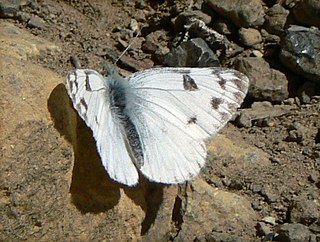
Platanus occidentalis, also known as American sycamore, American planetree, western plane, occidental plane, buttonwood, and water beech, is a species of Platanus native to the eastern and central United States, the mountains of northeastern Mexico, extreme southern Ontario, and extreme southern Quebec. It is usually called sycamore in North America, a name which can refer to other types of trees in other parts of the world. The American sycamore is a long-lived species, typically surviving at least 200 years and likely as long as 500–600 years.

Omphalea is a plant genus of the family Euphorbiaceae first described as a genus in 1759. It is native to tropical parts of the Americas, the West Indies, Asia, Australia, and Africa.

Cephalanthus occidentalis is a species of flowering plant in the family Rubiaceae that is native to eastern and southern North America. Common names include buttonbush, common buttonbush, button-willow, buck brush, and honey-bells.

Pachysphinx occidentalis, the big poplar sphinx, is a moth of the family Sphingidae. The species was first described by Henry Edwards in 1875. It lives throughout Canada and the United States. The habitat consists of riparian areas and suburbs.

Melitaea didyma, the spotted fritillary or red-band fritillary, is a Palearctic butterfly of the family Nymphalidae.

Pontia occidentalis, the western white, is a butterfly in the family Pieridae. It is found in Western North America.

Idia occidentalis is a species of litter moth of the family Erebidae first described by Smith in 1884. It is found in North America from southern Alberta and British Columbia, south to Colorado, Arizona and California.
Afromelittia occidentalis is a moth of the family Sesiidae. It is known from the Republic of the Congo, South Africa and Uganda.

Furcula occidentalis, the western furcula moth, double-lined furcula or willow kitten , is a moth of the family Notodontidae. It is found from southern Yukon and British Columbia to Nova Scotia, south to Maryland and west to Utah and Oregon.

Elachista occidentalis is a moth of the family Elachistidae. It is found from Fennoscandia to the Pyrenees, Italy and Greece and from Ireland to Poland.
Astrotischeria occidentalis is a moth of the family Tischeriidae. It was described by Annette Frances Braun in 1972. It is found in North America.
Trichromia occidentalis is a moth in the subfamily Arctiinae. It was described by Walter Rothschild in 1909. It is found in French Guiana, Ecuador and the Brazilian state of Amazonas.
Oreocossus kilimanjarensis is a moth in the family Cossidae. It is found in the Democratic Republic of Congo, Ethiopia, Kenya, Malawi, South Africa, Tanzania and Zimbabwe.

Oreocossus is a genus of moths in the family Cossidae.
Oreocossus grzimeki is a species of moth of the family Cossidae. It is found in Kenya.
Oreocossus politzari is a species of moth of the family Cossidae. It is found in Kenya.
Oreocossus ungemachi is a species of moth of the family Cossidae. It is found in Ethiopia.
Isophrictis occidentalis is a moth of the family Gelechiidae. It was described by Annette Frances Braun in 1925. It is found in North America, where it has been recorded from Utah.
Euxoa occidentalis is a species of cutworm or dart moth in the family Noctuidae. It was described by J. Donald Lafontaine and J.R. Byers in 1982 and is found in North America.

Pero occidentalis, the western pero, is a species of geometrid moth in the family Geometridae. It was described by George Duryea Hulst in 1896 and is found in North America.











